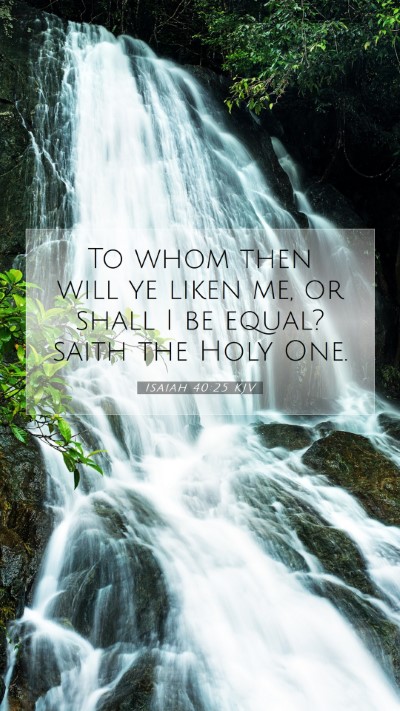Exploration of Isaiah 40:25
Isaiah 40:25 states, "To whom then will you compare me, that I should be like him?" This verse invites profound reflection on the nature of God and His uniqueness compared to any created being.
Bible Verse Meaning
The essence of Isaiah 40:25 emphasizes the absolute supremacy of God. Through this question, God challenges His creation to consider if any entity could possibly measure up to His greatness. The verse highlights several key insights drawn from public domain commentaries:
-
Uniqueness of God: According to Matthew Henry's Commentary, the verse underscores that God cannot be compared to mere mortals or idols. His existence, power, and attributes are beyond human comprehension or representation.
-
Divine Sovereignty: Albert Barnes points out that the rhetorical question serves to reaffirm God's sovereignty over all creation. The implied answer reinforces the notion that God is incomparable and supreme.
-
Rejection of Idolatry: In Adam Clarke's Commentary, the rejection of comparisons to idols is pertinent. This verse calls the Israelites to reflect on their idolatrous practices and recognize the futility of worshipping lesser beings created by God.
Scripture Analysis and Reflections
Delving deeper into Isaiah 40:25, we find a layer of inquiry concerning humanity's understanding of God:
- Philosophical Implication: The question posed by God stimulates philosophical thought regarding comparison and limits in human understanding. It poses a challenge to our perceptions and encourages further Bible study insights.
- Theological Consideration: The verse informs theological discourse on the nature and character of God. It invites an exploration of attributes such as omniscience, omnipotence, and omnipresence, reinforcing the reality that God transcends all human attributes.
- Practical Application: Understanding Isaiah 40:25 promotes a humble approach in our spiritual lives. Believers are encouraged to trust in God’s incomparable nature in times of distress and uncertainty.
Historical Context
This verse has a rich historical background in the context of the Babylonian Exile. The Israelites, surrounded by polytheism, were reminded of the uniqueness of Yahweh, their covenant God. The social and cultural milieu of the time was ripe for confusion and doubt, making the declaration of God's singularity even more poignant.
Additional Bible References
In studying Isaiah 40:25, it is valuable to consider cross-references that reinforce its themes:
- Isaiah 46:5: "To whom will you liken me and make me equal, and compare me, that we may be alike?"
- 1 Kings 8:27: "But will God indeed dwell on the earth? Behold, heaven and the highest heaven cannot contain you; how much less this house that I have built!"
- Romans 11:33: "Oh, the depth of the riches and wisdom and knowledge of God! How unsearchable are his judgments and how inscrutable his ways!"
Conclusion
In conclusion, Isaiah 40:25 serves as a powerful reminder of God’s supremacy and the futility of comparing Him to any other being. As believers engage in bible study groups or online bible study, this verse offers profound bible study insights that can facilitate meaningful discussions about the nature of God and our relationship with Him. Understanding Scripture in this light can deepen our faith and enhance our worship.


